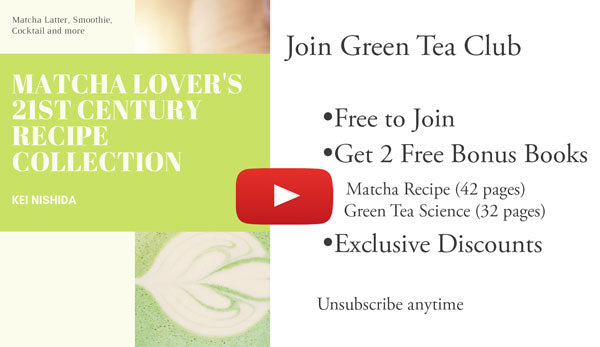Subscribe to Green Tea Podcast:
Is Stevia the Healthy Sugar Alternative for my Tea? - Green Tea Quiz
One of the greatest elements of tea is the sheer variety of its types. While Japanese green tea is incredibly popular in many parts of the world, black tea rules in others. Some enjoy caffeine-free "teas," such as chamomile tea, while an entirely separate world of matcha recipes appears to have established its unique culture. Whatever you want, flavor likely constitutes some part of your tea experience.
Given this, it is hardly surprising why tea "additives" are so popular. In fact, a quick review online reveals not only the various kinds of sweeteners available for teas but also a unique story of creativity. There are, however, some valuable questions of exploration. What sweeteners, for example, are healthy? What is "healthy"? How much is "too much"? While these questions may seem obvious, they help shape your tea's flavor profile. Without reviewing all sweeteners, this post will ask select yet essential questions about one of the most popular sweeteners available, Stevia.
I have written an article about 10 ways to sweeten your matcha green tea.

What is Stevia?
Various sweetener options are available these days, making it challenging to find the right one. For instance, many people wonder which option is best for Sucralose vs Stevia. So, let's learn more about Stevia.
When was Stevia Discovered as a Sweetener?
Dr. Moises Giacomo S. Bertoni and the chemist Ovidio Rebaudi observed the Stevia plant and discovered its sweetness. Scientists believed that the people in Eastern Paraguay had been using Stevia plant extracts as a sweetener since or earlier than the 16th Century.
When I think of the word "Stevia," it comes across more as a brand name than anything else. However, Stevia is a general sweetener from the perennial plant Stevia rebaudiana, which was later named from the discoverers' names and is native to parts of Brazil and Paraguay. The sweetener being discussed comes from the plant's leaves. While it does grow flowers, these are often cut to improve the leaves' flavor further. The Stevia leaves were gathered, dried, and milled into powder. Since Stevia has both sweet and non-sweet particles, there is a little bitter aftertaste. Its sweetness is derived explicitly from steviol glycosides.
Green tea's antioxidants are known to rejuvenate cells, resulting in slowing signs of aging and cleansing impurities. When adding Stevia, your drink, like latte, lemon green tea, or plain green tea, will be more enjoyable without sacrificing the green tea health benefits, and at the same time, enjoy the Stevia health benefits. Both of these foods maintain appetite and improve the digestive system. You will feel full after these with only a few calories, but remember to eat your meals. Unlike sugar, Stevia does not contribute to causing tooth decay.
What makes Stevia so Unique?
A few unique details about steviol glycosides help define Stevia as a particularly unique sweetener. First, steviol glycosides are reportedly 30–320 times sweeter than Sucrose. In other words, the Stevia you find at your local stores is more than likely sweeter than the sugar stored in your cupboard. Overall, Stevia can enhance the natural sweetness of green tea without overshadowing its delicate flavor. Second, much of your food produces a "glycemic response". This response refers to how food affects your blood sugar levels. Glycemic response is not necessarily a bad thing; in fact, it is common. However, inappropriate blood sugar levels can be concerning, and for certain populations, blood sugar levels are an everyday concern. Stevia is unique viz-a-viz sugar in this respect: Stevia does not induce a glycemic response because humans cannot metabolize it. This non-response makes Stevia an attractive sweetener option for people with diabetes.
Stevia vs. Other Sweeteners
Stevia is a natural sweetener, while sucralose is an artificial sweetener, and the same goes for aspartame and saccharin. These sugar substitutes
are great for weight loss and reducing blood sugar. Is Stevia the best sweetener among them? It is complicated since some artificial sweeteners make people crave more food despite being low-calorie sweeteners. Confusing the brain into thinking that you are still hungry. However, some studies found that consumers are less hungry and consume less calories. A sugar alternative or substitute directly from natural, no-preservative foods will be best for safety.
Stevia as a Brown Sugar Alternative
Sometimes, using Stevia with other sweeteners is unavoidable if we want to bake a delicious and aesthetically pleasing dessert. Manufacturers combine Stevia with agave nectar, monk fruits, Erythritol, Allulose, or sugar. A brown sugar version of Stevia powder contains Stevia with other natural sweeteners such as Erythritol, molasses, allulose, or natural fruit extracts.

Green Tea Stevia - Health Benefits
Stevia also contains fewer calories than Sucrose and is considered a zero-calorie sweetener. Lastly, several Stevia benefits may include lower blood pressure, antioxidants, and help with weight-loss diets. Stevia helps dilate blood vessels to improve the passage of nutrients and oxygen throughout the body. Stevia is anti-carcinogenic, meaning it can lower the risk of having cancer.
Forms of Stevia in Groceries
As mentioned, the Stevia leaf is 30 to 320 times sweeter than Sucrose, but Stevia powder is less sweet, although it is easy to use in drinks and food, and you can achieve your desired sweetness. A Stevia extract is up to ten times less sweet than using a Stevia leaf.
Stevia Dried Leaves
The FDA does not recommend adding whole leaf or crude extracts of Stevia to food, even as an ingredient. These are not approved food additives due to inadequate toxicological information. Still, it is legal to sell Stevia leaves. Steep the stevia leaves to produce a Stevia extract.
According to WhatSugar from Adriane, 1 teaspoon of sugar equals steeping 6 to 7 Stevia leaves. Some people prefer using leaves to be sure that the Stevia they use is from natural sources. However, steeping stevia leaves takes a bit more time and effort and washing additional cups than using a powdered form.
Stevia Powder
Usually, a gram of Stevia powder or one packet of Stevia powder equals 3-4 grams or 1 teaspoon of sugar. Stevia powder is the most consumed form of stevia used in cooking or baking. Stevia in a packet is easy to bring wherever you go. It is best to use a spoon when adding Stevia so you do not use too much, which will lead to an overly sweet or unpleasant taste. It is also hard to clean when you spill some powder.
Stevia Syrups
It is convenient to pour in drinks and does not need to dissolve. You do not need to use a spoon or tear a packet to mix the syrup. Some Stevia syrups are combined with natural sweeteners, but they are also combined with artificial sweeteners to make a thicker Stevia liquid. That is why if you prefer the most natural Stevia form, syrups might only be ideal if you find an all-natural Stevia syrup. Stevia drops are in liquid form and convenient to bring when traveling.
Stevia Tablets
It's nice to bring in your bag and travel-friendly. If the food store does not have a natural sweetener or Stevia, you can order a plain drink and add a Stevia tablet. However, the disadvantage of using these Stevia tablets is their stronger bitter aftertaste than other Stevia forms.

The Perfect Sweetener?
The short answer is that there is no perfect sweetener, and Stevia is no exception. Like any food or drink, the idea of "balance" concerning intake is the key. The US Food and Drug Administration and its European equivalent, the European Food Safety Authority, have specified that an acceptable daily intake of steviol glycosides is up to 1.8 mg per pound of body weight. For certain populations, such as people with diabetes, Stevia may be a great alternative sweetener. Stevia is also an acceptable sweetener for pregnant mothers as long as the product contains steviol glycosides.
Organic or Natural Stevia
Natural sweeteners may be refined or processed and contain synthetic ingredients such as high fructose corn syrup, Xylitol from wood pulps, and sugar alcohols. In contrast, organic sweeteners must comply with USDA's organic standards and labeling regulations.
If you want organic Stevia, read the ingredients carefully. Only a few are pure Stevia leaf extracts; the rest are often mixed with other sweeteners. According to WhatSugar, stevia is not just one ingredient; it has a variety of steviol glycosides, such as reb A, reb D, reb M, and stevioside, which make Stevia good tasting. Synthetic extracts not directly extracted from the Stevia leaves may be called Stevia. In this case, look for organic Stevia for the healthiest zero calories. Stevia, whether organic or not, is acceptable to use.
The Popularity and Rise of Stevia
Although Stevia was used long ago, it became popular in Japanese households in the 1950s and is now widely used in Asia.
In 1991, Stevia was banned in the US due to various studies that suggested it may be cancer-causing. In 1995, it was approved as a supplement and not a sweetener. Eventually, in 2008, the FDA declared Stevia a "generally recognized as safe" sweetener. This classification refers to substances recognized as safe through "expert consensus, scientific review, or widespread use without negative consequences." In fact, various countries, including Japan, Brazil, and China, had been using Stevia as a sweetener long before the 2008 FDA declaration. This claim is further buffered beyond the FDA and its European counterpart. It includes Food Standards Australia, New Zealand, Health Canada, and the Joint FAO/WHO Expert Committee on Food Additives.
There are stevia products that may contain additional sugars, including xylitol. Some sweeteners in stevia products may be sensitive to some people. For some, this may be trial and error; however, it is an important consideration if you have had sensitive experiences with various sweeteners. Some studies suggest that regular intake of Stevia may increase food intake over time.
All things considered, Stevia is regarded as a significantly refined sweetener, and its popularity, by and large, is hardly surprising. As of 2012, Stevia had 36% of the market share for sweeteners. In 2015, the global stevia market was estimated at approximately USD 337 million. Market trends expect sweeteners to continue growing in popularity. Given this and your increased knowledge of Stevia, what sweeteners work for you?
This post was first published in 2022 but updated in 2024, just for you.
Get Free Bonus Books

Sign up for free to the Green Tea Club to get advice and exclusive articles about how to choose Japanese Tea, and tips, tricks, and recipes for enjoying Japanese tea.
About the author
Kei Nishida
Author, CEO Dream of Japan
Certification: PMP, BS in Computer Science
Education: Western Washington University
Kei Nishida is a Japanese green tea enthusiast, a writer, and the founder and CEO of Japanese Green Tea Co., a Dream of Japan Company. His passion for introducing America to the tea of his homeland was the catalyst for creating the only company that brings high-quality tea from Arahataen Green Tea Farms to the rest of the world. Learn more about Kei
























